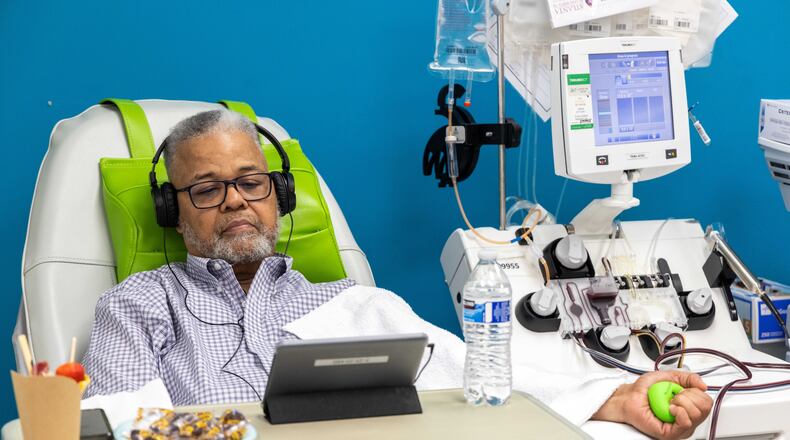Lawrenceville’s Donald Bagley rolled up his sleeves when a friend from church needed help for her husband.
And he’s never stopped donating blood platelets, those minuscule cells that play a vital role in clotting and healing in cancer and other critically ill patients.
Not in 17 years.
“It’s just the right thing to do,” Bagley said.
On Jan. 25, he achieved “super donor” status when he made his 300th blood platelet donation to Atlanta Blood Services, at Northside Hospital Atlanta in Sandy Springs.
Only one donor has given more platelets there than Bagley in the past 25 years, said Nancy Herring, donor recruitment supervisor at Atlanta Blood Services.
Bagley said he initially planned to make a one-time donation for his friend. But then he was called and asked to give another, then another, he said.
“They’d call. I’d come. They’d call. I’d come,” Bagley said.
Credit: Phil Skinner
Credit: Phil Skinner
For most of the 17 years, he’s driven from Lawrenceville to Sandy Springs twice a month to donate platelets. If traffic is bad at I-285, the trip can occasionally take him two hours. Giving the donation takes another two to two and a half hours.
“It does mean something to me,” Bagley said. “I get satisfaction, especially when they have a survivor dinner, and they invite me to it.”
The platelet recipients “are so appreciative,” he said. “I kind of feel like a rock star.”
Zoe Neisler, 22, of Macon, is one of the grateful.
“I don’t believe I’d be alive were it not for the people like him who give so religiously,” she said.
Credit: Phil Skinner
Credit: Phil Skinner
Diagnosed with acute myeloid leukemia in 2022, Neisler received 100 units of blood and platelets, along with chemo and a stem transplant from a donor in Poland. By February 2023, she was in full remission and pursuing her dream of becoming a nurse.
“I feel like I have an extra heart for nursing and healthcare now, after going through everything,” she said.
Herring said Bagley’s commitment creates the potential to save up to three lives for every 2.5 hours he spends making a donation. His donations through the years have helped 825 times, she said.
“To meet the needs of all patients, we need more donors to strive to reach these important milestones.,” Herring said. “When people ask, ‘How did he do that?’ I always tell them one donation at a time.”
With less than 3% of eligible people giving blood or blood platelets, “the clear message is that we need more donors committed to helping others,” she said. “Even with his incredible commitment, he can’t do it alone.
At 70, and still working, Bagley said he has no plans to stop donating.
While he has scaled back to once a month, his mantra remains: “I will continue until I can’t.”
HOW TO HELP
The U.S. currently has a critical shortage of blood and blood products. Donors are needed.
Whole blood is the most flexible type of donation. It can be transfused in its original form or used to help multiple people when separated into its specific components of red cells, plasma, and platelets.
- Who it helps: Whole blood is often given to trauma patients and people undergoing surgery.
- The time it takes to donate: About 1 hour
- Blood types needed: All blood types
- Donation frequency: Every 56 days, up to 6 times a year
Platelets are tiny cells in the blood that form clots and stop bleeding. Platelets are most often used by cancer patients and others with life-threatening illnesses and injuries. A single donation of platelets can yield several transfusable units. It takes about five whole blood donations to make up a single transfusable unit of platelets.
- Who it helps: Platelets are a vital element of cancer treatments and organ transplant procedures, as well as other surgical procedures.
- Time it takes: About 2.5-3 hours
- Needed blood types: A positive, A negative, B positive, O positive, AB positive and AB negative
- Donation frequency: Every seven days, up to 24 times/year
Source: Atlanta Blood Services
About the Author
Keep Reading
The Latest
Featured




